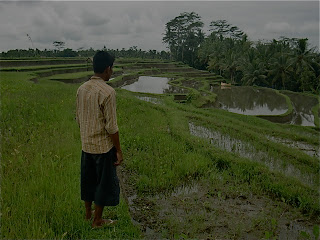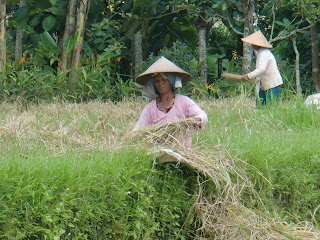Rice farmers are usually between 40 and 60 years old. They speak Balinese, Indonesian and Dutch. They are men and women. Generally, the men prepare the rice paddy for planting and plant the new plants and the women harvest the rice, but I bet besides the plowing that takes a lot of strength, men and women probably both do all other jobs.
I didn't see many younger people around Ubud, a tourist town, in the rice fields. It is hard work and since there are a lot of service jobs, young people prefer to do that. Every Balinese young person considering college I spoke to was going to major in hotel management.The only thing that stops the resorts from building on rice fields is elevation-too much rain.
Farmers in Bali can raise three or four crops of rice a year. Three, if the rice is the traditional sticky rice and four if you grow the hybrid rice. I got to see all the stages of rice farming. It happens in 30-100 acre rice paddies all around the house I stayed I (and around all the resorts.) If I jump out my balcony window I’d land in a rice paddy.
Just in case I missed something important concerning the process, I asked traditional artist and rice farmer Made Mariasta to take me on a two hour hike around rice paddies, including the irrigation system and rice paddy temple. Here are some photos of what I saw.
 |
| Rice an Expat would love |
 |
| Some use cows, most use a tractor if they can afford one |
 |
| Action outside my Bali veranda |
 |
| He plows for three days straight and for 6-8 hours |
 |
| Time for some water for the tractor-Balinese don't carry water bottles |
 |
| Unimagined Benefit! Eels to eat or sell in morning market |
 |
| This bird is looking for the eels as well |
 |
| After plowing, smooth out the mud |
 |
| After a few days, the nursery grows thick with new rice grass from some rice thrown in! |
 |
| Baby grass is planted in perfect rows: Rice temples get a lot of offerings and ceremonies 4 times a year |
 |
| Rice terraces an have 8 feet walls that do not need support to stand-all clay. |
|
 |
| Made Mariasta's rice field |
 |
| Made who is an artist and rice farmer. Each farmer owns or leases one paddy for extended family |
 |
| This rice paddy viewed by artist and guide Gde is registered in UNESCO as a world treasure |
 |
| Almost ready to harvest |
 |
| Ready! |
 |
| Time to cut and thrash it to separate out the rice |
 |
| Flipping the rice on bamboo trays the wind carries away the chaff |
 |
| Ducks are rice paddy partners: they fertilize, provide eggs and get homes and a rice feast after harvest |
 |
| A resting spot for rice farmers with fire pit |
 |
| Every part of the plant is used; this is for the cows |
 |
| Dried rice grass is burned and used as fertilizer for next crop. |
 |
| Time for refreshment before admiring the irrigation system |
 |
| Green coconut has two treats inside |
 |
| Made Mariasta prepares a 1 liter coconut drink for me |
 |
| I felt bad wasting some of the coconut milk-one liter is a lot to drink at one time |
 |
| Part 2: coconut pudding |
 |
| Bali has hundreds of North to south parallel rivers that rice farmers divert to fill rice paddies |
 |
| Going over a gully |
 |
| Classic paddy irrigation that can be controlled |
 |
| Back in Made Mariasta's studio with the original traditional painting I bought |
 |
| R to L: Nyoman, Wayan and Made which translated means 3rd born, 1st born and 2nd born. |

































No comments:
Post a Comment